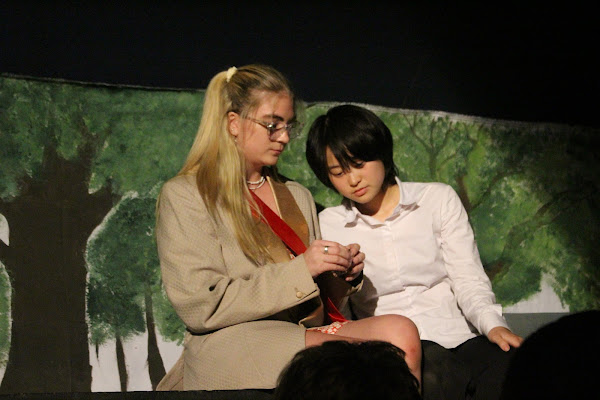Tuesday, 4 April 2023
BRAEBURN’S 1984 BROUGHT ORWELL’S DYSTOPIA TO LIGHT
By Margaretta wa Gacheru (posted 4.4.2023
Braeburn school’s 6th formers dared to do the unthinkable and stage an ambitious play like the George Orwell classic, 1984 during these otherwise stressful exam times.
It was as if by producing the play itself, they were acting in defiance of the unwritten rule that during these days, it’s taboo to do anything other than diligently focusing on studying for those sacred exams.
It was our good fortune to be present last weekend to see Braeburn’s adaptation of Orwell’s critical novel to a stage creation that was at least as bone-chilling and worrisome as the novel was and continues to be. Orwell wrote a disturbing dystopia about what’s conceivable in a society that loses a grip on independent thinking, and gives itself to a Hitler, a Mussolini, or a Donald Trump. It’s a world in which a lie is reckoned to be true and vice versa, where ignorance is seen as strength, and good is evil and evil is seen to be good. It’s a land of Doublethink and Qanon, and where surveillance is the order of the day, and people can die for thinking a critical thought about Big Brother.
When Orwell was writing, back in 1949, it was post-world war two, and few people were imagining that such a dystopia could ever be. Naming his novel 1984 further distanced his drama such that few people realized the Western world would ever go the Orwellian way.
1984 came and went and still, the public wasn’t terribly disturbed by an extreme right-wing blowback in the aftermath of the Vietnam war. In fact, it wasn’t until 2013 that Duncan McMillan adapted Orwell’s farsighted novel to the stage, and I’m told it was Braeburn’s own director, Daniel Hird who adapted the adaptation to extend the action of the play and broaden its ramifications.
In the novel, there is just one man, Winston Smith (played brilliantly by Ella Zhao) who, being a low-level civil servant, see the surveillance system of Big Brother and struggles to secretly disassociate himself from it.
Seated with his buddies, Syme (Njeri Maina) and Parsons (Amie Kaha), Winston watches the way the surveillance system even seeps into the schools, teaching children to spy and squeal on their friends and neighbors if, in any way, someone is not conforming to Big Brother’s ideology.
Winston is appalled at seeing the way one little girl spies on a guy who’s wearing shoes of a different design from what anyone else is wearing. The child follows the stranger with the culpable shoes and reports him. In no time, the lad gets picked up and is never heard or seen again.
Winston’s friend Parsons takes it all as a big joke. But not Winston. He is tempted to join the resistance movement of youth who make their presence felt by moving throughout the theatre and shouting ‘Down with Big Brother’. But he thinks twice about joining, knowing it can be dangerous to do so. And indeed, his friend Parsons is dragged from her sleep after she’s overheard shouting ‘Down with Big Brother’ from within her dream world.
But Winston meets one girl he believes he can trust. Julia (Shannon Bell) looks too good to be true, as she swears her love for him and sets up secret rendezvous points where they can meet supposedly outside the system’s omniscient eye.
Winston’s trust in Julia isn’t shattered despite his being hauled in by O’Brian (Abbas Jiwanji) who cleverly gives him a warning. But it doesn’t come soon enough. In the play, it isn’t quite clear what specifically led to Winston’s treatment by the Thought Police. Was it Julia who turned him in? or someone’s discovery his diary? Or Big Brother’s all-seeing capacity to understand Winston’s opposition mentality.
What comes next makes one appreciate Emma Zhao’s ability to endure what looked a bit too much like authentic water-boarding for my taste. She certainly got seriously roughed up for her wayward thoughts as Winston. And one felt her/his pain when he saw that Julia was an accomplice, a fully-fledged member of the system. She’s part of the Ministry of Love!
Ultimately, O’Brian lets him know that there’s a goal to this torture. It is to change his way of thinking, to make him stop thinking of himself as an individual. In effect, it is to delete himself from history.
Talk about depressing. Braeburn picked a brilliant but dark story to tell. The show needed a stronger narrator to give us a better grip on the essence of 1984.
Subscribe to:
Post Comments (Atom)



No comments:
Post a Comment